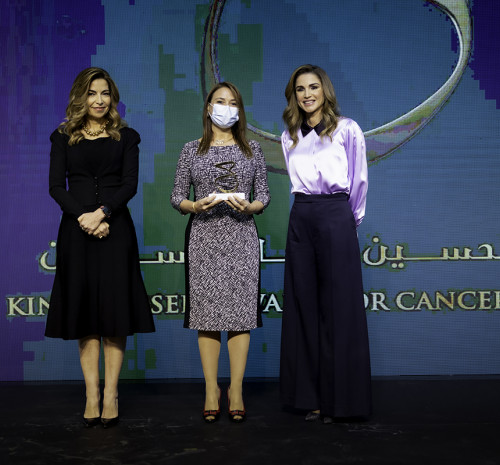- About Us
- The Award
- Media Center
- Awardees
- Partners

Dr. Raya Saab
Associate Professor of Pediatrics and Adolescent Medicine - American University of Beirut Medical Center
Research Project - Established
Dr. Raya Saab is a pediatric oncologist at the Children’s Cancer Institute at the American University of Beirut Medical Center (AUBMC), in Beirut, Lebanon. Her research focuses on molecular mechanisms of tumor suppression, and oncogenic pathways in the childhood tumor rhabdomyosarcoma. She has established a pediatric tumor and somatic DNA bank, a pediatric familial cancer registry, and a clinical research registry for pediatric oncology patients at AUBMC.
Dr. Saab has led multiple national collaborative clinical programs for diagnosis and multidisciplinary treatment of pediatric bone tumors, retinoblastoma, and solid tumors, with enrollment of patients across Lebanon and neighboring countries, providing centralized diagnosis and staging, and unified treatment across all collaborating centers. She spearheaded the formation of a regional network for pediatric oncology, the POEM (Pediatric Oncology East and Mediterranean region) group, for which she currently serves as the Scientific Director. POEM provides a platform for collaborative efforts to improve training, clinical care, and research in pediatric oncology in the region. She is also actively involved with and serving on several committees for international bodies such as ASCO, SIOP, and the recent WHO GICC initiative, for efforts to improve global pediatric oncology care and capacity building.
Recent work in her laboratory has identified secreted exosomes as relevant mediators of paracrine signaling in the aggressive childhood tumor rhabdomyosarcoma, and that specific oncogenic proteins influence the content of exosomes, mediating invasion via the small RNAA miR-486-5p. Ongoing studies in her laboratory are evaluating targeting specific exosome cargo in rhabdomyosarcoma as a treatment approach, and identifying relevant exosome biomarkers in children with rhabdomyosarcoma. Findings from these studies are hoped to improve the detection and treatment of this aggressive childhood tumor.
